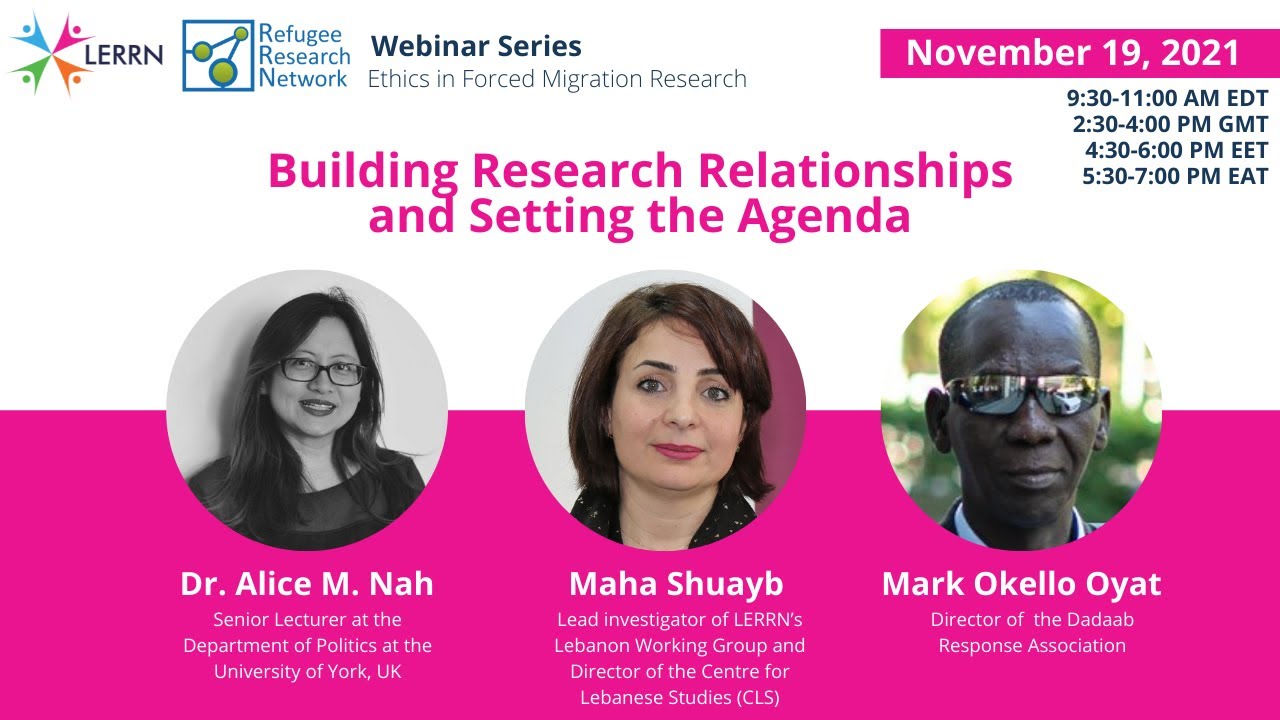In the second of a series of webinars on the ethics of forced migration research co-hosted by the Local Engagement Refugee Research Network (LERRN) and the Refugee Research Network (RRN), our panel of speakers reflected on the theme of building research relationships and setting the agenda. The panel featured Dr. Alice Nah, Senior Lecturer at the Department of Politics at the University of York, UK and one of the founding members of the Asia Pacific Refugee Rights Network, as well as Mark Okello Oyat, Director of the Dadaab Response Association. During the webinar, Dr. Oroub El-Abed joined the panel, bringing her experience as Regional Research Coordinator for LERRN in Jordan and Lebanon, and as Lead Researcher in Jordan for the Centre for Lebanese Studies.
The panel began by reflecting on the importance of questions on research partnerships and agenda-setting. Moderator Susan McGrath, reflecting on the experiences of the RRN and the challenges of sustaining a research network, highlighted the open-access book, entitled Mobilizing Global Knowledge: Refugee Research in an Age of Displacement. Alice Nah, who started her work on displacement as an advocate and activist, discussed how institutional incentive structures can take academics away from relevant research by emphasizing theoretical contributions to academic disciplines over relevance, practical impact, or solutions to the problems displaced communities face. That can make it challenging for academics to do reciprocal and impactful research.
For Mark Okello Oyat, who lives in an encampment, this conversation is personal because researchers usually come from outside of the camp with their own research agenda and set of questions, which limits the participation of refugees themselves. It is important to empower refugees to tell their own stories and to conduct their own research on topics that they consider to be important. An alternative approach, like the one taken by LERRN, has provided researchers from Dadaab a platform to publish their research on refugee education as LERRN Working Papers. These papers examine topics that have been neglected in previous research and global discussions, such as Mark’s paper on the issue of corporal punishment in refugee schools. Mark emphasized that refugees who are empowered to be independent researchers are then able to connect with scholars around the world.
The panelists criticized how refugees are sometimes brought into research partnerships as subordinate research partners. Oroub El-Abed asked “What is the role of refugee researchers being involved? Is it just getting them to do the work or are we really empowering them?” The speakers advocated for involving refugees and local researchers from the beginning of conceptualizing the problems and asking the questions they see as important in their communities, rather than recruiting refugees to implement existing projects.
Mark suggested that research cannot only be about knowledge production, but needs to have a purpose. The evidence collected in research is an important foundation of advocacy for policymakers to lobby for changes in policy and practice. Oroub suggested that research can be part of standing against the authoritarian oppression of refugees and disturbing states involved in that oppression. Making space for refugees in research can involve theatre, exhibitions, or documentaries in addition to traditional written research publications. Alice also emphasized the importance of making the research relevant in different forums, including within scholarly, practitioner, and refugee communities. Well-respected institutions and scholars in the North can also lend legitimacy to the research findings of refugees and local researchers, and stand with them in solidarity when there are potential risks for speaking up.
The discussion raised important questions about trust, power, and resources. Unfortunately, some recent scholarship has not connected with long-standing conversations on these debates. Without reflecting on these questions, we risk reproducing power asymmetries, inequalities, and problematic policy paradigms. Alice questioned how some ever-present issues get onto research agendas in the first place and asked “Who has the power to turn something into something worthy of investigation, worthy of investment?” As explained in a recent open-access article by LERRN researchers (Beyond the partnership debate: localizing knowledge production in refugee and forced migration studies), localizing knowledge production will require transferring power – including power to set the research agenda – to researchers in the South. One of the key features of the LERRN partnership is that the research agenda is set by working groups in East Africa and the Middle East. One thing we have learned during the pandemic is that virtual spaces open up possibilities for more inclusive and global conversations.
Click here to watch a full recording of this webinar.
Stay tuned for future webinars in the series in 2022!
This report was prepared by: Rachel McNally, LERRN Knowledge Mobilization and Translation Officer; Amanda Klassen, LERRN Project Officer; and Kail Schlachter, LERRN Project Writer.
The LERRN-RRN Webinar Series on Ethics in Forced Migration Research is coordinated by Rachel McNally, LERRN Knowledge Mobilization and Translation Officer. For further information or ideas please contact us here.
